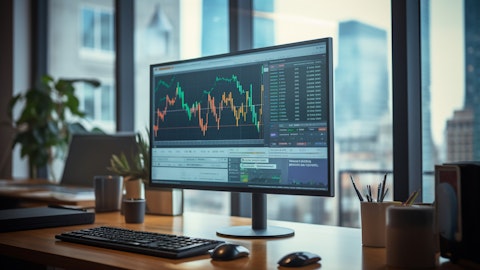Charles Liang: Yeah. Again, two reasons, right? Q4, we will have a strong revenue. So, we had to prepare with Q4. And, also, I mean, liquid cooling, I mean, it’s new. So, we had to prepare enough safety inventory for liquid cooling demand for June quarter and September quarter as well. So that’s another reason why we have a slightly higher inventory now.
David Weigand: Yeah. And I want to add, Nehal, that that’s exactly why we did capital raises, too, is to prepare for these Q4 shipments, and so that we could make those large purchases and we hope to continue that.
Operator: Thank you. The next question is from the line of Matt Bryson with Wedbush. Your line is now open.
Matt Bryson: Hi, thanks for taking my question. I would be thinking with liquid cooling ramping in fiscal Q4, and not to harp on the gross margin issue, but that you would be seeing a benefit to gross margins. And I guess my question is, is there any chance that either with the liquid cooling solutions or with your other solutions, that you’re again seeing some penetration at those larger customers and specifically hyperscalers, and that’s why we’re seeing gross margins come down? And I guess just one clarification for Dave. If you can provide the magnitude that revenues were affected by your inability to procure components in fiscal Q3? Thanks.
Charles Liang: Let me add a little bit. Because liquid cooling is new to us, so to speed up quick support for some of our very important customer on June quarter, indeed, we had to pay some premium to speed up the supply. So, we spend a bunch of [indiscernible].
David Weigand: Yeah. So, the two questions, Matt, I would say, first of all, to the gross margin question, again, I try to give a — my philosophy is, give a conservative [indiscernible] to beat that. And we were able to do that in Q3 and we’ll do everything we can do it — can do to beat it in Q4. But it’ll depend also on what we ship. As to the magnitude of revenue, I’ll go back to the fact that our backlog is at a record high. And so what that means is that every quarter we could have shipped more if we had more parts. And so therefore, it’s an ongoing problem and we don’t rely on that as an excuse. The fact of the matter is, we’re glad to be able to produce the products that we’re producing for some of the best companies in the world. And so, we continue — we will continue to do that and we’re very upbeat by the fact that the supply chain continues to improve each quarter.
Operator: Thank you. The next question is a follow-up from Jon Tanwanteng with CJS Securities. Your line is now open.
Jon Tanwanteng: Hi, thanks for the follow-up. I was wondering if you could speak to your cash usage expectations over the next quarter or two. Are the proceeds from your recent capital raises all spoken for, as you look to the growth in the pipeline and record backlog you spoke to, or do you think that’s more in reserve for growth further down the line?
David Weigand: Yeah. So, the way I would answer that is that, I hope that I have — that I need more capital, Jon, because that means that we’re booking — that we’re growing revenues even faster. So, we’ve got capital adequate to get us through the current market, which means today. But in a week, that — we hope that that changes, and we hope that we’ve got orders that require even more capital. So, all I can say is I hope that — I’m hoping for the needs for more capital.
Charles Liang: Yeah. We believe our revenue will continue to grow strong, and that’s why we need more capital to grow faster. If we grow 20%, 30%, we may have enough capital now. But if we grow much faster, then for sure, we need more capital to grow stronger.
Operator: Thank you. Our final question today is a follow-up from the line of Nehal Chokshi with Northland Capital. Your line is now open.
Nehal Chokshi: Hey, thanks. Thanks for the follow-up question. This is for Charles. Charles, with the capital base that you have now — and I hear you, Dave, that you hope that you will need more capital. But with the capital base that you have now, technology advantage that you’ve always had that you’ve added to, is there anything else that you need in order to become the number one server vendor?
Charles Liang: Yes. Indeed, our plan is very ambitious. Let me use that word. We have a very ambitious brand, so we try to continue grow very strong, kind of 3 times to 5 times faster than our industry’s average. So, when that case happen, and we believe so, we hope so, then for sure we need more capital.
Operator: Thank you.
Charles Liang: Thank you. I’ll see you in next quarter.
Operator: Thank you. That concludes today’s conference call. Thank you all for your participation. Have an excellent rest of your day.
Follow Super Micro Computer Inc. (NASDAQ:SMCI)
Follow Super Micro Computer Inc. (NASDAQ:SMCI)
Receive real-time insider trading and news alerts





